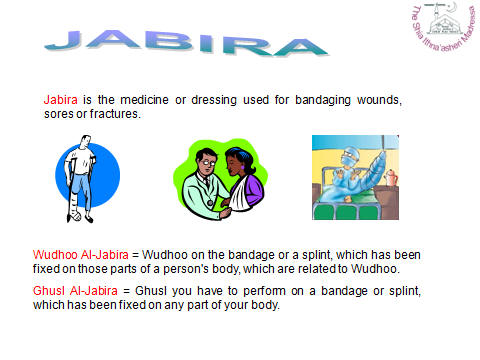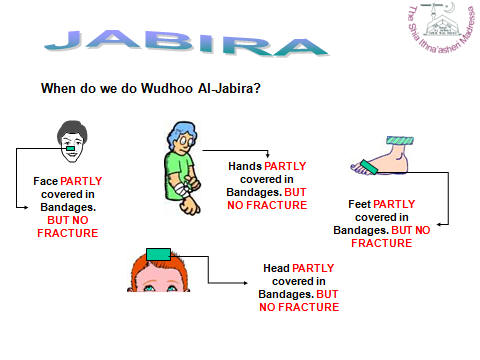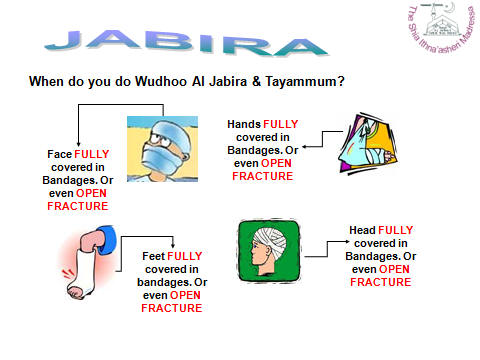FROM ISLAMIC LAWS BOOK
copyright
www.World-federation.org
‘Jabīrah’ refers to the thing
with which a wound or a break in a bone is bandaged, and to
medication that is applied to a wound etc.
Ruling 323. If on one of the parts of the body on which wudū’
is performed there is a wound, boil, or broken bone, in the
event that it is uncovered and water is not harmful for the
person, he must perform wudū’ in the normal manner.
Ruling 324. If a wound, boil, or broken bone is on one’s
face or arms, and it is uncovered, and pouring water over it
is harmful, then the area around the wound or boil must be
washed from top to bottom in the manner that was explained
with regard to wudū’. And if drawing a wet hand over it is
not harmful, it is better that one draws a wet hand over it,
places a pure cloth over it, and then draws a wet hand over
the cloth as well. As for the case of a broken bone, it is
necessary to perform tayammum [instead of jabīrah wudū’].
“Ruling 325. If a wound, boil, or broken
bone is on the front part of the head, or on the feet, and
it is uncovered, then in the event that one cannot wipe it –
meaning that the wound, for example, covers the entire area
that is to be wiped, or for some reason he is unable to wipe
even the unaffected areas – in such a case, it is necessary
for him to perform tayammum; and based on obligatory
precaution, he must also perform wudū’ and place a pure
cloth over it and wipe over the cloth with the wetness of
the wudū’ water left on his hand.”
Ruling 326. If a boil, wound, or broken bone
is covered, and uncovering it is possible without causing
excessive difficulty, and water is not harmful for the person,
then he must uncover it and perform wudū’, irrespective of
whether the wound and suchlike is on the face or arms, or on the
front part of the head, or on the feet.
Ruling 327. If a wound, boil, or broken bone that
is covered is on the face or arms, in the event that it is
harmful to uncover and pour water over it, one must wash as much
of the area around it as possible; and based on obligatory
precaution, one must also wipe over the jabīrah.
“Ruling 328. If it is not possible to uncover a
wound but the wound and the thing that has been placed over it
are pure, and if making water reach the wound is possible and
not harmful, then one must make water go over the wound from top
to bottom. If the wound or the thing that has been placed over
it is impure, in the event that it is possible to wash that
thing with water and to make water go over the wound, one must
wash it with water and at the time of performing wudū’ he must
make the water reach the wound. And in the event that water is
not harmful for the person but washing it with water is not
possible, or, if uncovering the wound causes excessive
difficulty or it is harmful for him, he must perform tayammum.”
““Ruling 329. If the jabīrah completely covers
one of the parts of the body on which wudū’ is performed, then
performing jabīrah wudū’ is sufficient. However, if the jabīrah
covers all or most of the parts of the body on which wudū’ is
performed, then based on obligatory precaution, one must perform
tayammum and jabīrah wudū’.
Ruling 330. It is not necessary for the jabīrah
to be made of something that one is permitted to wear when
performing prayers. Therefore, if the jabīrah is made of silk or
parts of an animal whose meat is unlawful to eat, it is
permitted to wipe over it.
Ruling 331. If someone has a jabīrah on the palm
of his hand or on his fingers, and at the time of performing
wudū’ he draws his wet hand over it, he must wipe his head and
feet with the same moisture [that has gathered on the jabīrah].”
“Ruling 332. If the jabīrah covers the entire surface of the top
of the foot except for an area over the toes and at the top of
the foot, one must wipe the places that are uncovered and over
the jabīrah that is covering the other parts.
Ruling 333. If there are several jabīrahs on one’s face or arms,
he must wash between them; and if the jabīrahs are on the head
or on the feet, he must wipe between them; and for those places
covered by the jabīrah, he must act according to the rules of
jabīrah.
“Ruling 334. If the jabīrah has covered more than
the normal area around the wound and it is not possible to
remove it without causing excessive difficulty, one must perform
tayammum, unless the jabīrah is on a place of the body that
tayammum is performed on, in which case it is necessary to
perform both wudū’ and tayammum. In both cases, if it is
possible to remove the jabīrah without causing excessive
difficulty, the jabīrah must be removed. Therefore, if the wound
is on the face or arms, the area around it must be washed; and
if it is on the head or on top of the feet, the area around that
must be wiped; and for the place of the wound, one must act
according to the rules of jabīrah.”
Ruling 335. If there is no wound, cut, or broken
bone on a part of the body on which wudū’ is performed but water
is harmful for the person for some other reason, he must perform
tayammum.
Ruling 336. If phlebotomy32 has been performed on one of the
parts of the body on which wudū’ is performed and one cannot
wash it with water, it is necessary to perform tayammum.
However, if one can wash it with water but water is harmful for
him, then he must act according to the rules of jabīrah.
Ruling 337. If something is stuck on a part of one’s body on
which wudū’ or ghusl is performed and it is not possible to
remove it, or the difficulty involved in removing it is such
that it cannot be endured, then his responsibility is to perform
tayammum. However, if the thing that is stuck is on a part of
one’s body on which tayammum is performed, it is necessary to
perform both wudū’ and tayammum. Furthermore, if the thing that
is stuck is some form of treatment, it is ruled as
Ruling 338. For all ghusls – apart from the ghusl given to a
corpse – jabīrah ghusl is performed like jabīrah wudū’; however,
based on obligatory precaution, one must perform it in sequence.
If there is a wound or a boil on the body, one has the choice of
performing ghusl or tayammum; and in the event that one chooses
to perform ghusl and the wound is not covered, the recommended
precaution is that he places a pure cloth over the wound or the
uncovered boil and wipes over the cloth. However, if there is a
broken bone in the body, one must perform ghusl, and as a
precautionary measure, he must also wipe over the jabīrah; and
in the event that it is not possible to wipe over the jabīrah or
the place of the broken bone is uncovered, it is necessary to
perform tayammum.”
“Ruling 339. If someone’s responsibility is to perform tayammum
but on some of the parts of his body on which tayammum is
performed he has a wound, boil, or broken bone, he must perform
jabīrah tayammum in accordance with the rules of jabīrah wudū’.
Ruling 340. If someone must perform prayers with
jabīrah wudū’ or ghusl, in the event that he knows his
legitimate excuse for not performing normal wudū’ or ghusl will
remain valid until the end of the time for prayers, he can
perform prayers at the beginning of their time. However, if he
has hope that his legitimate excuse will expire before the end
of the time for prayers, it is better that he waits; and in the
event that his legitimate excuse remains valid, he must perform
prayers with jabīrah wudū’ or ghusl at the end of the time for
prayers; and in the event that he performed prayers at the
beginning of their time and his legitimate excuse expired by the
end of the time for prayers, the recommended precaution is that
he should perform wudū’ or ghusl and repeat the prayers.
Ruling 341. If someone keeps his eye lashes stuck together
because of an illness in his eye, he must perform tayammum.
Ruling 342. If someone does not know whether his
duty is to perform tayammum or jabīrah wudū’, then based on
obligatory precaution, he must perform both of them.
Ruling 343. The prayers that one performs with
jabīrah wudū’ are valid, and he can perform subsequent prayers
with that wudū’ as well.”
Excerpt From: Al Sayyid Ali Al-Husayni Al-Sistani.
“Islamic Laws.” iBooks.
This material may be protected by copyright.
|



